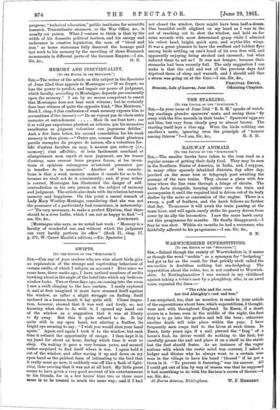MEMORY AND INDIVIDUALITY.
[To TTIZ EDITOR OR TRI SPROTATOR."3 SIR,-.—The writer of the article on this subject in the Spectator of June 22nd thus appeals to Montaigne :—"If we forget, we lose the power to predict, and impair our power of judgment, which faculty, according to Montaigne, depends pm-eminently upon the memory." I am by no means competent to assert that Montaigne does not bear such witness; but he certainly does bear witness of quite the opposite kind, "Des Menteurs," Book I, chap. 8 (his confession of weak memory exposes him to accusations d'gtre insensi):—"Ils ne voyent pas de chois entre
memoirs et entendement Mais ils me font tort; car il se void par experience plustost au rebours, que les memoires excellentes se joignent volontiers aux jugemens debiles." And, a few lines below, his second consolation for his weak memory is thus given :—" Outre que, comme disent plusiews pareile exemples du progrez de nature, elle a volontiers for- tifie d'autres facultez en moy, 1 mesure que cette-cy [i.e., memory] s'est affoiblie ; et irois facilement couchant et allanguissant mon esprit et mon jugement, stir lea traces d'autruy, sans exercer leurs propres forces, si lea inven- tions et opinions estrangeres m'estoient presentee par le benefice de la memoirs." Another of his consola- tions is that a weak memory makes it unsafe for us to lie, because we shall not do it consistently; and, if your writer is correct, Montaigne has illustrated the danger of self- contradiction in his own person on the subject of memory and judgment. The article also deals with the relation between memory and happiness. On this point a casual remark of Lady Mary Wortley-Montagu, considering that she was not the possessor of a particularly bad conscience, is noteworthy: —" 'Tis very necessary, to make a perfect Elysium, that there should be a river Lethe, which I am not so happy to find."—I [Montaigne also says, as we noted last week : "Memory is a faculty of wonderful use, and without which the judgment can very hardly perform its office" (Book II., chap. 17, p. 371, W. Carew Hazlitt's edition).—Eu. Spectator.]




















































 Previous page
Previous page